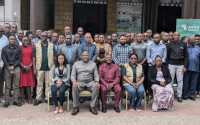Harnessing Local Wisdom for Global Resilience: More Need To be Done to Tame Climate Change
By Lucy Sebastian, Kilimokwanza.org
In the face of mounting environmental challenges, the call for sustainable development practices has never been more urgent. Across the African continent, communities are grappling with the harsh realities of climate change: droughts that stretch rivers dry, floods that erase seasons of toil, and storms that leave despair in their wake. Yet, amidst these trials lies a beacon of hope — the indomitable spirit of African innovation and resilience. It is time for us to turn towards our roots, harnessing local wisdom and sustainable practices, to chart a course towards a resilient future.
Our ancestors understood the delicate balance between human needs and environmental stewardship. They cultivated the land with respect, practiced crop rotation, and utilized natural resources judiciously, ensuring that the earth could regenerate and sustain future generations. This age-old wisdom, combined with today’s technological advancements, provides a blueprint for sustainable development that could mitigate the impacts of climate change and secure the well-being of our communities.
However, the path to sustainability is fraught with challenges. Multinational corporations and foreign investments, lured by short-term gains, often overlook the long-term environmental consequences of their actions. Deforestation, water pollution, and biodiversity loss are but a few symptoms of a larger disease — a disregard for the environmental limits within which humanity must operate. The time has come for African nations to assert their right to a sustainable future, demanding practices that prioritize ecological balance and community resilience.
Grassroots movements across the continent are leading the way, showcasing the power of collective action. From the Green Belt Movement in Kenya, which has planted over 51 million trees, to the innovative solar projects lighting up rural communities in Nigeria, these initiatives embody the spirit of sustainable development. They prove that when communities are empowered and given the tools to succeed, they can make significant strides towards combating climate change.
Yet, grassroots efforts alone cannot bear the weight of this global challenge. Policy reform plays a crucial role in facilitating sustainable development. Governments must enact and enforce regulations that promote environmental conservation, renewable energy adoption, and sustainable agriculture practices. Furthermore, policies that empower women and youth are critical, as these groups are often the most affected by climate change and the most potent agents of change in their communities.
Education is another cornerstone of sustainable development. By integrating environmental education into our schools’ curricula, we can cultivate a new generation of environmentally conscious citizens, equipped to tackle the challenges of climate change. Moreover, by providing platforms for traditional knowledge to be shared alongside scientific research, we can foster a more holistic understanding of sustainability.
The international community also has a pivotal role to play. Climate change knows no borders, and the actions of one nation can have far-reaching impacts on the global community. Developed nations, in particular, must honor their commitments to reduce greenhouse gas emissions and support developing countries in their transition to green economies. Financial aid, technology transfer, and capacity-building initiatives are essential components of this support, ensuring that all nations have the means to pursue sustainable development.
As we stand at this critical juncture, the message is clear: the time for action is now. We must draw upon our collective strength, embracing the wisdom of our ancestors, the innovations of today, and the promise of a sustainable future. Let us forge partnerships across sectors, from grassroots organizations to governments and international bodies, to drive meaningful change. Together, we can overcome the challenges of climate change, ensuring that our planet remains a vibrant, nurturing home for generations to come.
The journey towards sustainable development is both a challenge and an opportunity. It is a challenge because it requires us to rethink our ways of living, working, and interacting with our environment. Yet, it is also an opportunity — a chance to redefine progress, not by the wealth of our economies, but by the health of our communities and the integrity of our ecosystems. For the sake of our planet and future generations, let us embrace this opportunity with open hearts and determined spirits. The road ahead is long, but together, we can pave the way to a sustainable, resilient future.
*Lucy Msangi Sebastian is a seasoned journalist and communications specialist with a rich background in mass communications, specialising in public relations. Email lucysebastian98@gmail.com


